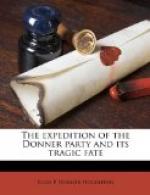The town seemed deserted, and the church filled, as we started homeward, I skipping ahead until we reached a shop window where I waited for Jakie and asked him if he knew what those pretty little things were that I saw on a shelf, in big short-necked glass jars. Some were round and had little “stickers” all over them, and others looked like birds’ eggs, pink, yellow, white, and violet.
He told me the round ones were sugar plums, and the egg-shaped had each an almond nut under its bright crust; that they were candies that had come from France in the ships that had brought the Spanish people their fine clothes; and that they were only for the rich, and would make poor little girls’ teeth ache, if they should eat them.
Yet, after I confided to him how mother had given me a lump of loaf sugar each night as long as it lasted, and how sorry we both felt when there was no more, he led me into the shop and let me choose two of each kind and color from the jars. We walked faster as I carried them home. Jakie and grandma would not take any, but she gave Georgia and me each a sugar plum and an egg, and saved the rest for other days when we should be good children.
CHAPTER XXII
GOLD DISCOVERED—“CALIFORNIA IS OURS”—NURSING THE SICK THE U.S. MILITARY POST—BURIAL OF AN OFFICER.
In the year 1848, while the settlers and their families were contentedly at work developing the resources of the country, the astounding cry, “Gold discovered!” came through the valley like a blight, stopping every industry in its wake.
Excited men, women, and children rushed to town in quest of information. It was furnished by Alcalde Boggs and General Vallejo, who had been called away privately two weeks earlier, and had just returned in a state of great enthusiasm, declaring that gold, “in dust, grains, and chunks had been discovered at Coloma, not more than a day’s journey from Sutter’s Fort.”
“How soon can we get there?” became the all-absorbing problem of eager listeners. The only hotel-keeper in the town sold his kettles and pans, closed his house, and departed. Shopkeepers packed most of their supplies for immediate shipment, and raised the price of those left for home trade. Men and half-grown boys hardly took time to collect a meagre outfit before they were off with shovel and pan and “something big to hold the gold.” A few families packed their effects into emigrant wagons and deserted house and lands for the luring gold fields.
Crowds from San Francisco came hurrying through, some stopping barely long enough to repeat the maddening tales that had started them off to the diggings with pick and shovel. Each new rumor increased the exodus of gold-seekers; and by the end of the first week in August, when the messenger arrived with the long-hoped-for report of the ratification of the treaty of peace, and General Mason’s proclamation officially announcing it, there were not enough men left in the valley, outside of the barracks, to give a decent round of cheers for the blessing of peace.




